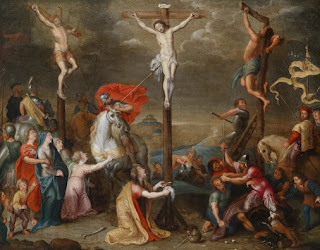The two thieves
 Christ wasnot crucified alone. Of those who diedwith him, Luke’s Gospel tells us the following:
Christ wasnot crucified alone. Of those who diedwith him, Luke’s Gospel tells us the following:There were also two others, criminals, led with Him to be putto death. And when they had come to theplace called Calvary, there they crucified Him, and the criminals, one on theright hand and the other on the left… Then one of the criminals who were hangedblasphemed Him, saying, “If You are the Christ, save Yourself and us.” But the other, answering, rebuked him,saying, “Do you not even fear God, seeing you are under the samecondemnation? And we indeed justly, forwe receive the due reward of our deeds; but this Man has done nothing wrong.” Then he said to Jesus, “Lord, remember me whenYou come into Your kingdom.” And Jesussaid to him, “Assuredly, I say to you, today you will be with Me in Paradise.”(Luke 23:32-33, 39-43, NKJV)
The second manhas come to be known as the “good thief” or the “penitent thief,” because hiswords indicate repentance. His referenceto fear of God evinces a reverent attitude. His acknowledgement that, in being put to death, he is receiving hisjust deserts shows that he ultimately put righteousness above the goods of thislife. His plea to Christ indicates faiththat Jesus was who he claimed to be, and could secure for him an eternal reward.
The firstman has come to be known as the “impenitent thief,” because his words indicatethe opposite of repentance. He is notreverent, but mocking. He shows noconcern about whether his punishment is deserved and ought to be accepted, butworries only about saving his life. Hedoubts and perhaps dismisses altogether the idea that Jesus really is the Christ,and evinces no hope for the hereafter.
The penitentthief was saved, and it stands to reason that the impenitent thief wasdamned. Indeed, in his treatment of thesignificance of the two thieves, Thomas Aquinas writes:
As Pope Leo observes (Serm.iv de Passione): “Two thieveswere crucified, one on His right hand and one on His left, to set forth by thevery appearance of the gibbet that separation of all men which shall be made inHis hour of judgment.” And Augustine onJohn 7:36: “The very cross, if thou mark it well, was a judgment-seat: for thejudge being set in the midst, the one who believed was delivered, the other whomocked Him was condemned. Already He hassignified what He shall do to the quick and the dead; some He will set on His right,others on His left hand.” (SummaTheologiae III.46.11)
We are usedto hearing, in the story of the good thief, reassurance that salvation ispossible even for the worst of us, and even until the point of death. And it is indeed that. We are perhaps less used to thinking of thestory of the two thieves as also a warning about damnation. But that is how saints Leo, Augustine, andThomas understood it.
Now, Christexplicitly promises Paradise to the one thief, but we are not told whether hesaid anything to the other. Is it possiblethat the apparently impenitent thief may also have repented before death? Interestingly, Matthew 27:44 and Mark 15:32 speakof both thieves reviling Jesus, whereas Luke has one of them reviling him andthe other rebuking the first. Commentingon this fact, St. Ambrose suggests that “perhaps this other at first reviled,but was suddenly converted” (as quoted inAquinas’s Catena Aurea). But Ambrose does not suggest that the badthief too may have repented, and if anything the scriptural evidence impliesthe opposite. Judging just from Matthewand Mark, you’d think neither of them repented. If Luke is essentially telling us that reviling Christ was not in factthe end of the story in the case of one of the thieves, it would be bizarre ifhe didn’t also mention that it was not the end of the story in the case of theother one.
In anyevent, Ambrose goes on to say that “mystically, the two thieves represent thetwo sinful people who were to be crucified by baptism with Christ (Rom. 6:3),whose disagreement likewise represents the difference of believers.” He appears to mean that the good and badthieves represent, respectively, those among the baptized who persevere inrighteousness until death, and those among the baptized who fall away.
If this isso, then the story of the two thieves gives us, as Aquinas says, a foreshadowingof the Last Judgment, and the eternal salvation or damnation of thosejudged. Each of us will share the fateof either the good thief or the bad thief, and as with them, which destiny weface will not be a settled matter until we draw our last breath. The story of the two thieves thus does indeedprovide grounds for hope, but also a grave warning against presumption.
Relatedposts:
Edward Feser's Blog
- Edward Feser's profile
- 326 followers



